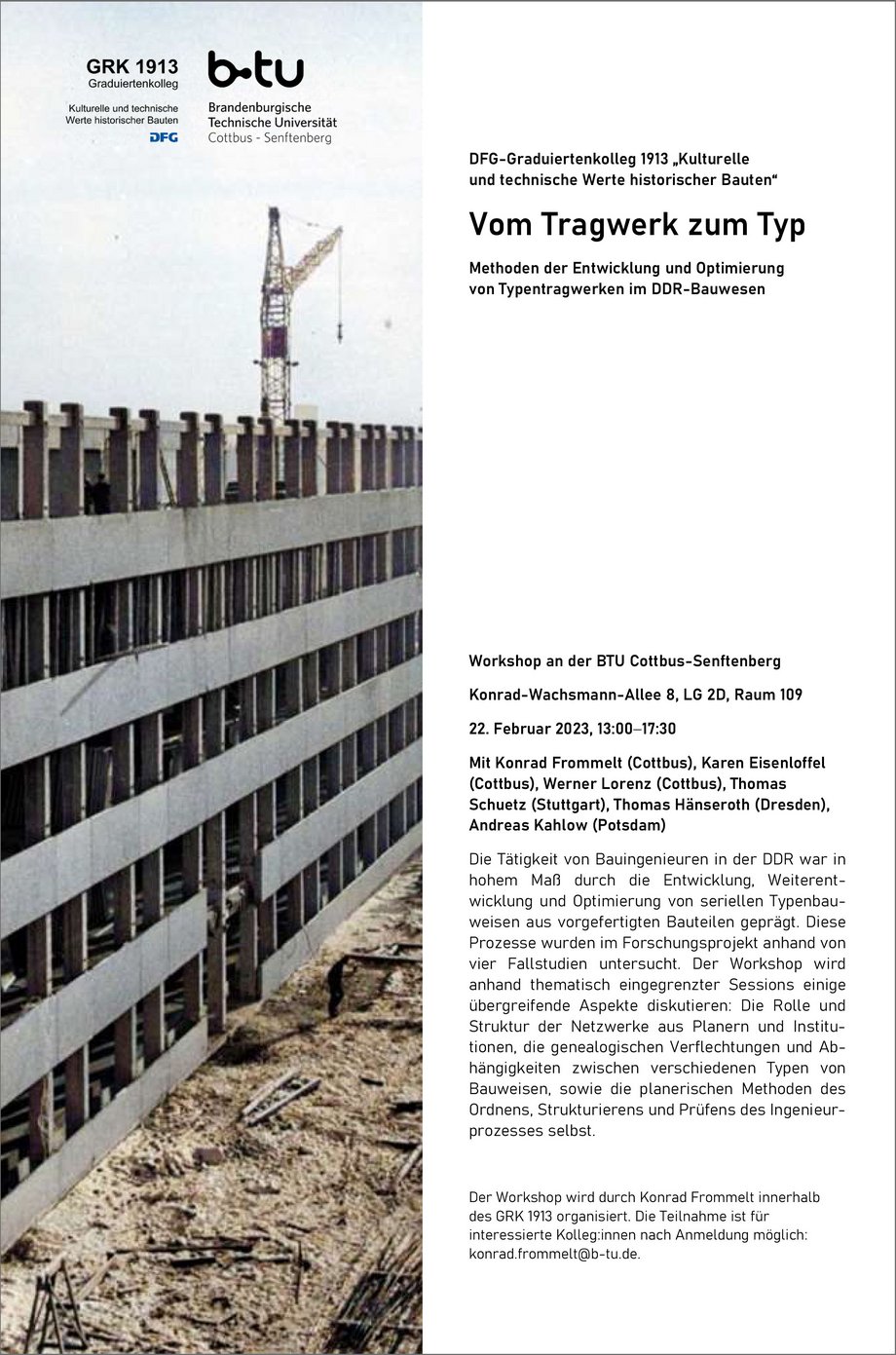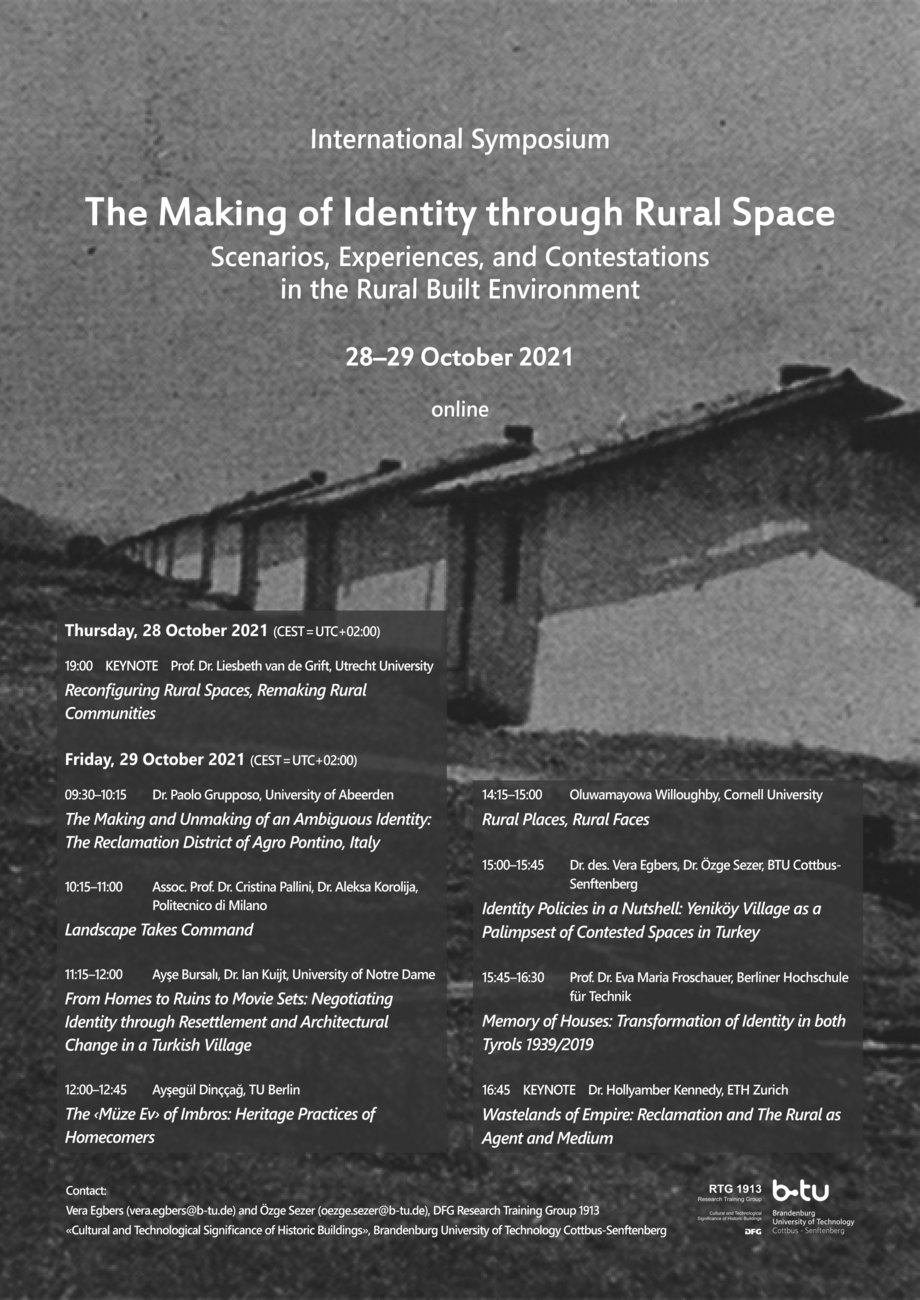Symposien und Workshops
Die international ausgerichteten Symposien dienen der Diskussion der Leitfragen sowie der Ergebnissicherung der zweijährig durch das Kolleg geförderten Postdoktoranden-Tandems. Hierzu werden internationale Expertinnen und Experten zu den interdisziplinär ausgerichteten Themen eingeladen und ergänzen damit das durch die Postdoktorandinnen und Postdoktoranden bearbeitete Themenfeld durch eigene Standpunkte und disziplinäre Perspektiven. Durch die Symposien soll vor allem der Diskurs zwischen den Ingenieur- und Geisteswissenschaften zu spezifischen Forschungsthemen verstärkt und so ein Beitrag zu deren interdisziplinärer Verortung erbracht werden. Die Ergebnisse der Symposien werden in der Publikationsreihe des Kollegs im Birkhäuser Verlag veröffentlicht.
Die von den Doktorandinnen und Doktoranden des DFG-Graduiertenkollegs auf eigene Initiative hin organisierten Workshops dienen der Vertiefung der jeweiligen Forschungsprojekte durch die Einbeziehung neuer Forschungsperspektiven, der vergleichenden Auseinandersetzung mit Quellen und Materialien sowie der Einbindung von Kooperationspartnern in das Kolleg. Sie finden in der Regel als halb- bis ganztägige Veranstaltungen im Semester statt und werden von den Doktorandinnen und Doktoranden geleitet. Im Mittelpunkt der Workshops stehen dabei Leitfragen, die aus den einzelnen Dissertationsvorhaben entwickelt werden.
Informationen zu den vergangenen Symposien und Workshops finden Sie im Veranstaltungsarchiv.
Vom Tragwerk zum Typ. Methoden der Entwicklung und Optimierung von Typentragwerken im DDR-Bauwesen Workshop, 22. Februar 2023, BTU Cottbus-Senftenberg
Mit Konrad Frommelt (Cottbus), Karen Eisenloffel (Cottbus), Werner Lorenz (Cottbus), Thomas Schuetz (Stuttgart), Thomas Hänseroth (Dresden), Andreas Kahlow (Potsdam)
Der von Konrad Frommelt zusammen mit Experten der Bautechnikforschung und der Wissenschaftsgeschichte der DDR veranstaltete Workshop soll anhand thematisch eingegrenzter Sessions einige übergreifende Aspekte seiner Dissertation Reallabor Cottbus. Bauweisenentwicklung zwischen Hochschule und Bauindustrie in der DDR 1960–1990 diskutieren. Dabei stehen die Rolle und Struktur der Netzwerke aus Planern und Institutionen, die genealogischen Verflechtungen und Abhängigkeiten zwischen verschiedenen Typen von Bauweisen sowie die planerischen Methoden des Ordnens, Strukturierens und Prüfens des Ingenieurprozesses selbst im Vordergrund der Diskussion.
Session 1: Ingenieur-Netzwerke
Ingenieurtechnische Planungsprozesse in der DDR lassen sich mit Begriffen kollektiver Planung angemessen umreißen. Die bewusste Marginalisierung der individuellen schöpferischen Leistung zugunsten der kollektiven Problemlösungskompetenz bildete einen Kern planerischen Selbstbewusstseins der Ingenieure in der DDR. Das spezifische Zusammenwirken von Institutionen zwischen Industrie und Hochschulen prägte dabei ganz entscheidend die konkrete Entwicklung von Typenprojekten.
Session 2: Genealogie und Phylogenese von Typentragwerken
Innerhalb des industrialisierten Bauwesens wandelte sich das Bauwerk zum Massenprodukt, das Zyklen industrieller Produktentwicklung unterworfen war. Der bauweisenspezifische Innovationsprozess erstreckte sich dabei von einer embryonalen Phase über eine Phase der initialen Markteinführung und sukzessive Verbesserungsschritte hin zu einer Reifephase. Oftmals ging diese Reife mit einer regionalen und einsatzspezifischen Variantenbildung einher und mündete in der Regel nach einem gewissen Zeitraum in der Obsoleszenz der Bauweise. Mit Werkzeugen der Genealogie und der Phylogenetik sollen die komplexen evolutionären Verflechtungen zwischen miteinander verwandten Bauweisen sichtbar gemacht werden.
Session 3: Kreative Prozesse und Evaluationsmethoden
Die Entwicklung industrieller Bauweisen war in hohem Maß durch Strukturierungsbestrebungen gekennzeichnet – in Form einer republikweiten Standardisierung von Maßordnung und Bauelementen wie auch von Fertigungsverfahren und Projektierungsprozessen. Im Hinblick auf eine fortschreitende Automatisierung gehörten dazu vielfältige Bestrebungen, Entwurfs- und Optimierungsprozesse einem Algorithmus zu unterwerfen. Neben der Entwicklungstätigkeit beschäftigte sich ein Teil der Forschung daher mit der gezielten Suche nach Methoden kollektiven Ideenmanagements und nach formalisierten Verfahren zum Vergleich und zur Bewertung von Varianten.
Die Veranstaltung findet von 13:00 bis 17:30 Uhr im LG 2D, R 109 statt. Die Teilnahme ist für interessierte Kolleg:innen nach Anmeldung möglich: konrad.frommelt(at)b-tu.de.
Approaching Difficult Heritage: Representation, Interpretation and Preservation between Europe and East Asia Public Lecture and Workshop, 24 and 25 January 2023, BTU Cottbus-Senftenberg
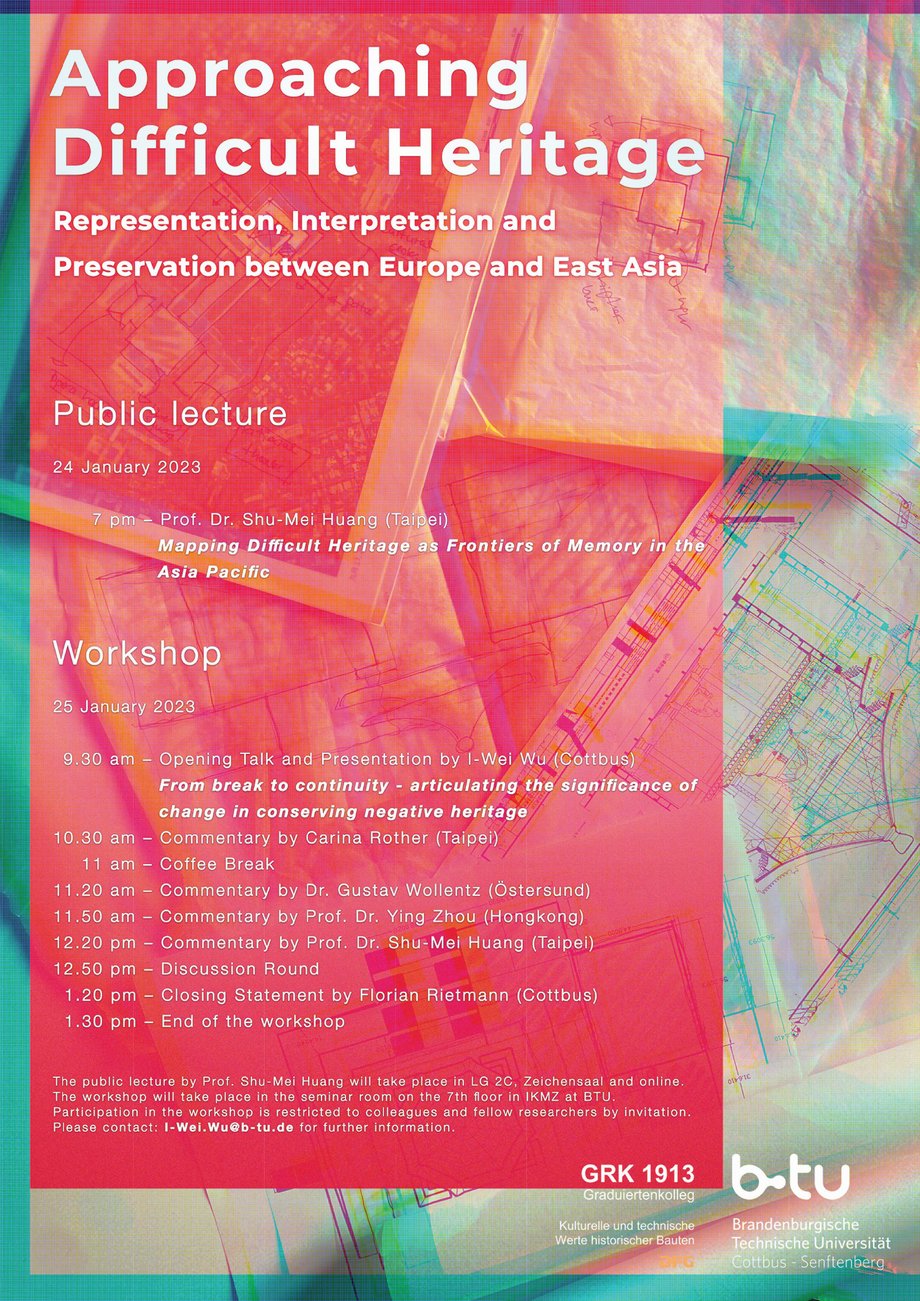
There is a growing interest in researching difficult heritage. The shifting attitudes towards critical perspectives within the field of heritage studies can be understood as a way of searching for new research paradigms or models. Dealing with difficult heritage sites for contemporary needs is one of the predominant challenges that post-conflict societies face today. This involves the challenges of representing contested histories between differing social or political actors, interpreting the history and meanings of places, and deciding how to preserve the architectural embodiments. Although the processes are complex, they simultaneously offer a multitude of possibilities for bringing about epistemological, methodological changes. Threshold of changes revolves around these central questions: How is the difficult past interpreted and how are memory narratives re-shaped? What attempts have been formulated to respond to the temporal and complex layers of a difficult heritage site? How can we understand human interaction with these sites over different time periods that might challenge a linear understanding of the concept of time? The workshop "Approaching Difficult Heritage. Representation, Interpretation and Preservation between Europe and East Asia" welcomes knowledge exchange beyond the European context by gathering scholars who have conducted case studies in Europe and East Asia, including Prof. Shu-Mei Huang (Taipei), Prof. Ying Zhou (Hong Kong), Dr. Gustav Wollentz (Östersund), Carina Rother (Taipei), Florian Rietmann (Cottbus). Together with the invited scholars, the workshop will facilitate discussions and commentaries on I-Wei Wu's research project entitled "From break to continuity: articulating the significance of change in conserving negative heritage" and bring in findings from different contexts. In doing so, it aims to deconstruct the tasks involved in dealing with such sites by bringing a variety of insights to approach the notion of difficult heritage.
Conceptual and Academic Coordination: I-Wei Wu (M.A., M.Sc.), PhD Candidate at the Heritage Studies programme and the DFG Research Training Group 1913, BTU Cottbus-Senftenberg
The public lecture by Prof. Shu-Mei Huang will take place in LG 2C, Zeichensaal and online.
The workshop will take place in the seminar room on the 7th floor in IKMZ at BTU. Participation in the workshop is restricted to colleagues and fellow researchers by invitation.
Please contact I-Wei.Wu(at)b-tu.de for further information.
The Past and The Present of Modernist Heritage: The Story of Ankara Workshop and Public Lecture, 8 November 2022, BTU Cottbus-Senftenberg
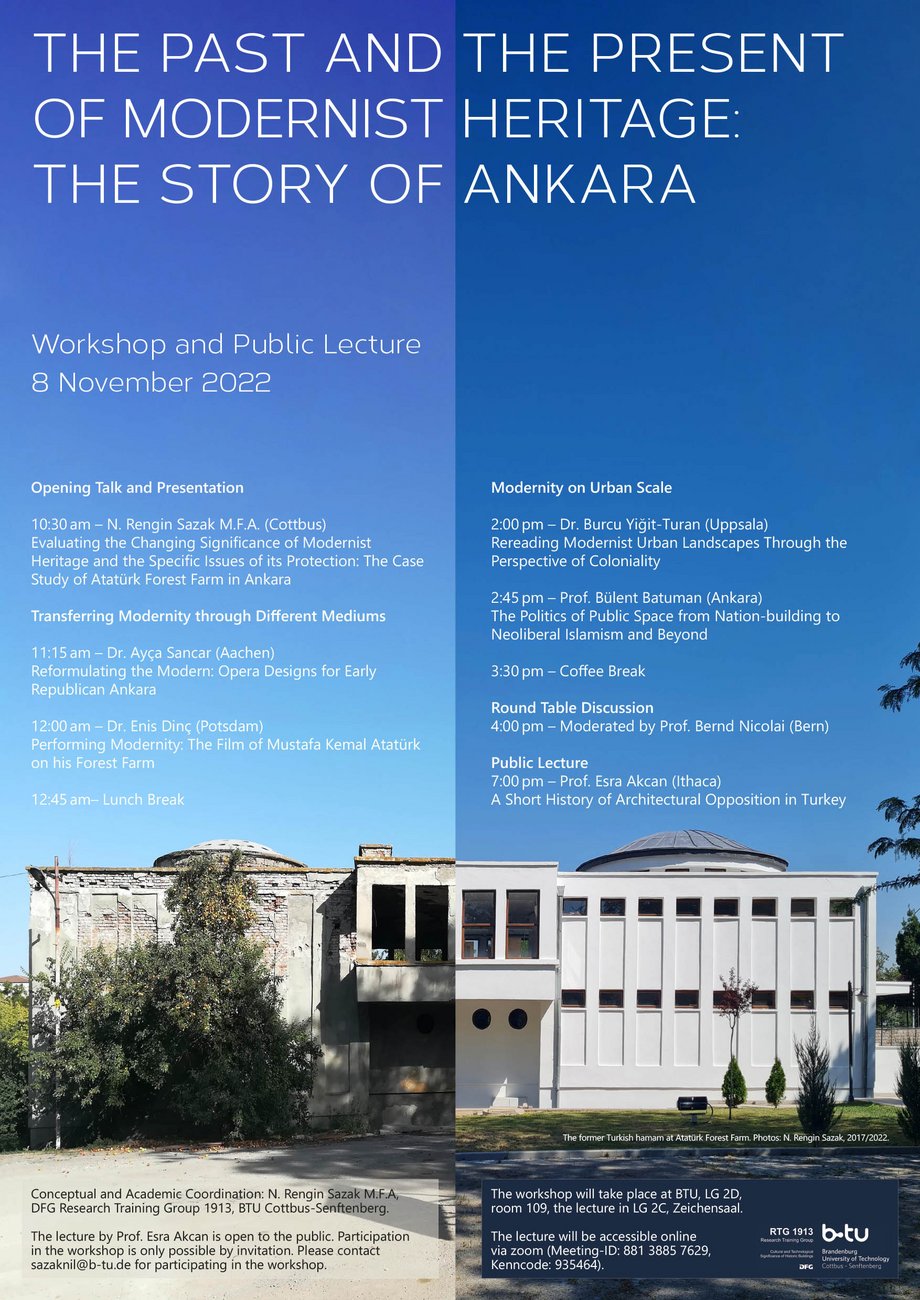
Ankara was a small central Anatolian town until it was declared the capital of Turkey in 1923 and after that, a mass transformation process in this small town started. Starting from the 1920s, architects and urban planners from Europe, especially from German-speaking countries, were invited to create the new silhouette of the city by using the architectural approach of that time, “modernism”, with a strong emphasis on building a nation-state. The modernist architecture was highly used for representing the Republican values and the new ideology, and between the 1920s and 1940s, the whole city plan, the landscapes, residential areas, governmental and institutional buildings, and universities were designed by architects and urban planners such as Clemens Holzmeister, Bruno Taut, Paul Bonatz, Martin Elsaesser, Carl Christoph Lörcher, Hermann Jansen, and Ernst Egli. This constant transformation of the city formed the backbone of the young capital and made Ankara a modernist phenomenon in the history of urban planning and architecture.
This workshop aims to bridge the past and present of these buildings by reassessing them in their historical context and raising new questions about the current situation of these buildings and their changing significance. The usage of modernism in the Early Republican period and transferring it via diverse mediums such as movies and on different scales such as landscapes or architecture, will be reassessed through the case of Ankara. Different examples of modernist heritage from the capital will be presented in a historical perspective by scholars from the field. In the second part of the workshop, protection issues of this heritage will be examined and the ideological position of this heritage in the recent political atmosphere will be discussed. Overall, a story of an era will be told with new narratives and recent changes about this heritage.
Conceptual and Academic Coordination: N. Rengin Sazak (M.F.A), PhD Candidate at the Heritage Studies program and Associated PhD Candidate at the DFG Research Training Group 1913, BTU Cottbus-Senftenberg
The lecture by Prof. Esra Akcan is open to the public. Participation in the workshop is only possible by invitation. Please contact sazaknil(at)b-tu.de for participating in the workshop.
The workshop will take place at BTU, LG 2D, room 109, the public lecture will take place at 7 pm in LG 2C, Zeichensaal and online via zoom.
International Conference “Archaeology and Architecture: New Methodologies for XXL Structures of Ancient Rome” 2–4 November 2022, DAI Rom
Objects of the conference are modern methodologies and techniques for studying Ancient Roman Architecture, with specific consideration of XXL structures. In the last years as never before, the technological development determined an enormous improvement in the analysis of ancient architectural sites. For the first time, one researcher can control the entire workflow, even in surveying big buildings, huge archaeological sites, or very articulated architectures.
The conference “ARCHAEOLOGY AND ARCHITECTURE: NEW METHODOLOGIES FOR XXL STRUCTURES OF ANCIENT ROME” will gather a group of international and interdisciplinary young researchers to share their own ongoing projects. The case studies will offer the opportunity to discuss theoretical approaches, methodologies, techniques, and future developments of the complex system of Roman architecture.
The conference was organized by Fabrizio Sommaini, doctoral student at DFG Research Training Group 1913 “Cultural and Technological Significance of Historic Buildings”, BTU Cottbus-Senftenberg and HU Berlin, with Klaus Rheidt and Janet DeLaine. Conference sessions will be chaired by Evelyne Bukowiecki, Heinz Beste, Maura Medri. The event will take place at the German Archaeological Institute Rome and is funded by Fritz Thyssen Stiftung.
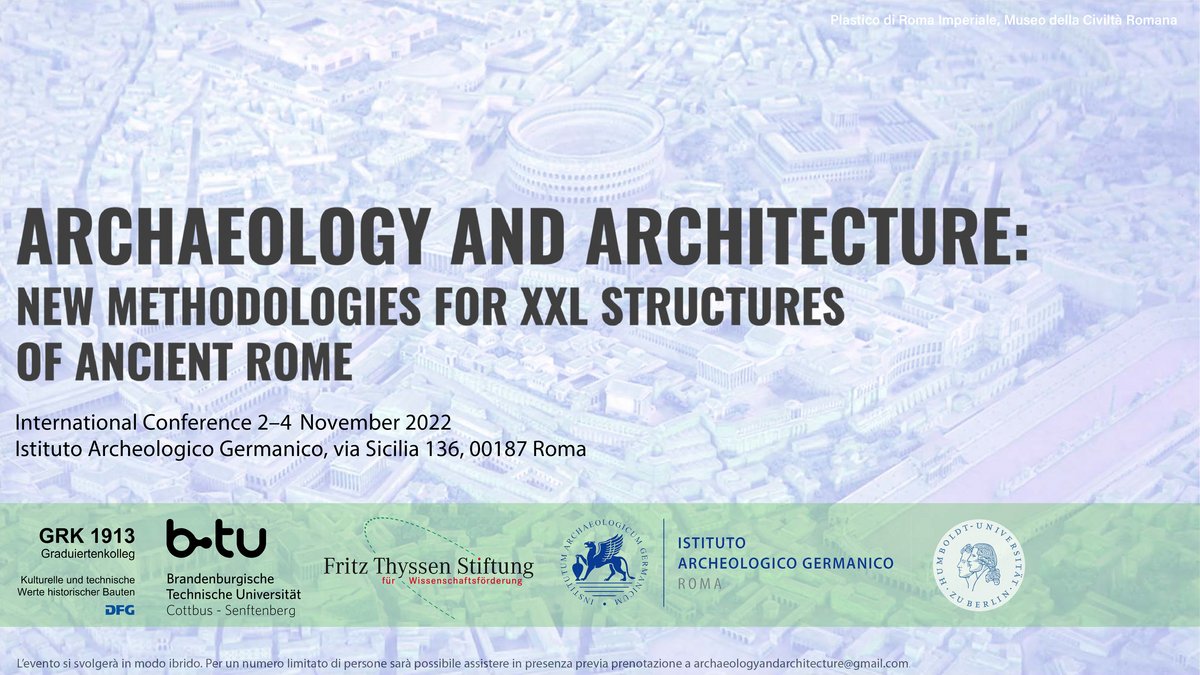
International Symposium “The Making of Identity through Rural Space: Scenarios, Experiences and Contestations in the Rural Built Environment”
28–29 October 2021, online
Rural space has played a substantial role in several social, cultural, economic, and ideological transformations through time. Such transformations are being studied through various scientific concepts. Among others, the implementation of new concepts that focus on shaping identities through the reproduction of spatial agents belonging to rural communities by direct and indirect political interventions remains crucial to grasp a broad understanding of these particular changes.
However, studies on the formation of identity through space have been primarily handled in the frame of urban studies until recent years. Yet, the various identity-making practices have certainly had significant influences on and through the rural built environment. In this symposium, we reopen the discussion of the making of identity in rural areas, which have dramatically changed under different political, social, and economic conditions from the verge of the 20th century until today, and potential contested spaces as traces of this process. We thereby seek a better in-depth understanding of spatial dynamics related to the specific cultural and social spheres of 20th’s century rurality.
The symposium took place as an online event, starting with an evening lecture on Thursday, 28 October.
Concept and organisation: Vera Egbers (vera.egbers(at)b-tu.de) and Özge Sezer (oezge.sezer(at)b-tu.de)
The conference report written by Dr. Firuzan Melike Sümertaş can be found as a pdf file under this link.

